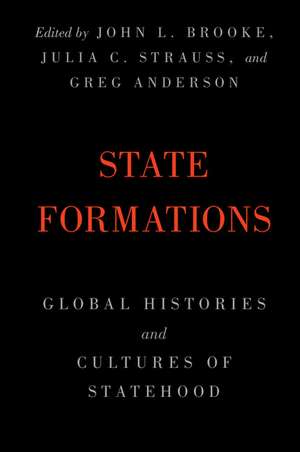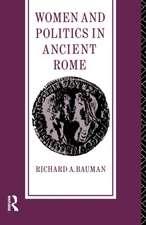State Formations: Global Histories and Cultures of Statehood
Editat de John L. Brooke, Julia C. Strauss, Greg Andersonen Limba Engleză Paperback – 28 mar 2018
Toate formatele și edițiile
| Toate formatele și edițiile | Preț | Express |
|---|---|---|
| Paperback (1) | 267.83 lei 3-5 săpt. | |
| Cambridge University Press – 28 mar 2018 | 267.83 lei 3-5 săpt. | |
| Hardback (1) | 789.21 lei 6-8 săpt. | |
| Cambridge University Press – 28 mar 2018 | 789.21 lei 6-8 săpt. |
Preț: 267.83 lei
Nou
Puncte Express: 402
Preț estimativ în valută:
51.25€ • 53.65$ • 42.41£
51.25€ • 53.65$ • 42.41£
Carte disponibilă
Livrare economică 15-29 martie
Preluare comenzi: 021 569.72.76
Specificații
ISBN-13: 9781108403948
ISBN-10: 1108403948
Pagini: 404
Ilustrații: 1 b/w illus. 2 maps 4 tables
Dimensiuni: 152 x 228 x 24 mm
Greutate: 0.55 kg
Editura: Cambridge University Press
Colecția Cambridge University Press
Locul publicării:New York, United States
ISBN-10: 1108403948
Pagini: 404
Ilustrații: 1 b/w illus. 2 maps 4 tables
Dimensiuni: 152 x 228 x 24 mm
Greutate: 0.55 kg
Editura: Cambridge University Press
Colecția Cambridge University Press
Locul publicării:New York, United States
Cuprins
Introduction: approaches to state formations John L. Brooke and Julia C. Strauss; Part I. Definitions: 1. On the person of the state Quentin Skinner; 2. The state as a social relation Bob Jessop; 3. Was there any such thing as a non-modern state? Greg Anderson; Part II. Foundings: 4. Comparative perspectives and early states revisited Rita P. Wright; 5. (Re) introducing the state on the medieval Swahili Coast Chapurukha M. Kusimba; 6. Renaissance states of mind Michael Martoccio; 7. Bringing the sarkār back in: translating patrimonialism and the state in early modern and early colonial India Nicholas J. Abbott; 8. Revolutionary state formation: the origins of the strong American state William J. Novak and Steven Pincus; 9. The founding of non-democratic states Richard Bensel; Part III. Agendas: 10. Empire as state: the Roman case Clifford Ando; 11. Weights and measures and state formation: the view from the early American republic Stephen Mihm; 12. Mapping power: the shape of the state in the post-Civil War American South Greg P. Downs; 13. To bee or not to bee: the co-production of modern science and the modern state John F. M. Clark; 14. Taxes and the two faces of the state since the eighteenth century Yannis D. Kotsonis; 15. Regimes and repertoires of statebuilding: the two Chinas and regime consolidation in the early 1950s Julia C. Strauss; Part IV. Memberships: 16. The Mesopotamian citizen conceptualized: affect, speech and perception Seth Richardson; 17. Military mobilization and the experience of living with the Ming state Michael Szonyi; 18. Ethnicity and power in early modern Europe and Asia Victor Lieberman; 19. Patriliny and modern states in the Middle East Diane King; 20. Social service, convivialismo, and hegemony in Colombia Rebecca Tally; 21. Indian affirmative action and the postcolonial state Anupama Rao; Conclusion: notes toward a global synthesis John L. Brooke and Julia C. Strauss.
Recenzii
'A genuinely global and epoch-spanning inquiry into the emergence and continuing transformations of state power, this eagerly awaited collection explodes the parochial tradition of treating modern North-Atlantic nation-states as normative. By demonstrating the diverse forms that emerging states have taken in Africa, Asia, and the Americas as well as Europe, from the ancient world until our own time, this path-breaking volume will instruct readers in multiple disciplines. Provocative, wise, and compelling, these essays challenge and rework both the Weberian focus on state autonomy and institutional capacity and Gramscian/Foucaultian claims concerning the embeddedness of the state in discourses and practices. State Formations offers a bold new framework for continuing debates.' James T. Kloppenberg, Charles Warren Professor of American History, Harvard University
'Reading through State Formations is an extraordinarily rewarding experience.' Peter Onuf, Thomas Jefferson Foundation Professor of History, Emeritus, University of Virginia
'Social science too often treats the existence of states as obvious and focuses on the societies they demarcate or their international relations. State Formations brings a broad historical and comparative perspective to show how states are made and change, how they differ, and how conventional assumptions can mislead analysis. This is a book rich in empirical cases, well-marshalled to improve new thinking and better theory.' Craig Calhoun, President, Berggruen Institute, California
'This excellent volume brings together contributions from historians and theorists in discussing a wide range of historical formations of the state …' George Steinmetz, University of Michigan
'Reading through State Formations is an extraordinarily rewarding experience.' Peter Onuf, Thomas Jefferson Foundation Professor of History, Emeritus, University of Virginia
'Social science too often treats the existence of states as obvious and focuses on the societies they demarcate or their international relations. State Formations brings a broad historical and comparative perspective to show how states are made and change, how they differ, and how conventional assumptions can mislead analysis. This is a book rich in empirical cases, well-marshalled to improve new thinking and better theory.' Craig Calhoun, President, Berggruen Institute, California
'This excellent volume brings together contributions from historians and theorists in discussing a wide range of historical formations of the state …' George Steinmetz, University of Michigan
Descriere
Uses modernist and postmodernist theoretical perspectives to examine the formation and reformation of states throughout history and around the globe.



